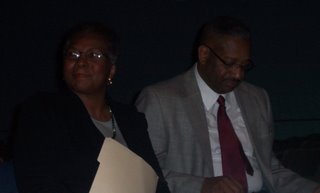
Brenda Artwell and Ron Walker of Atlas Learning Communities with Dr. Margaret Spencer Beale.
All Day Session with Dr. Margaret Beale Spencer
Here's what I took away from of yesterday's session with Dr. Margaret Beale Spencer. Let me know what I missed or got wrong.
I could listen to Dr. Spencer for a week. She is the kind of person who makes you feel privileged to hear her speak. She communicates a warmth and caring about people while she clearly explains her research and resulting data. There is both a kindness and urgency in what she says.
Part of what she says is straightforward and simply put, while some involves more complicated explanations of charts, grafts and research methodology.
"It's not the what, it's the how!"We can't look at a person, particularly a young person and really understand him/her, unless we know something about his/her experience.
"Context maters. i.e. environment matters!" For all Black youth, race is always part of the context.
Dr. Spencer explained that Human Development theory has 3 domains-cognitive; biological and physical; and affective, all working at the same time and each impacts the other 2. If one is off kilter in some way so will the other two be off.
Unfortunately when Black males are looked at in term of human development things seem to be different.
1. It is deviancy based-i.e. different from the "norm:"
2. It is without context.
3. It is atheoretical-there is no theory against which to place the data
4 It is non-developmental-it is static
5. Race isn't factored in
Young Black males are the most vulnerable group in our society. They are asked to be men, often too early in their development, and when they are unable to find positive expressions of manhood, they resort to a bravado that protects them in what is perceived as a hostile place.
There are other maladaptive responses young people make as they try to understand the world around them. For Black youth this has the added burden of their perceptions of society's negative view of them.
Adults need to intervene and help young people translate their experiences.
Dr. Spencer recommends that the elephant in the room, race, gets discussed openly and that these perception young people have be acknowledged by adults who work with them.
She gives the example of a mom reading a story to her child in which women play only subservient roles, telling the child that this author must be out of touch with reality. Girls do all the things the men are doing. She also suggested coloring in dark the hair and skin of drawings in fairy tales.
Dr. Spencer is asking us to look not just at behavior but to understand where that behavior comes from. Perhaps there is something a supportive adult could do that would relieve the source of a negative behavior.
She presented a vulnerability table in which there are four quadrants; high risk, low risk, high protective factors( such as support from parents or other adults, income etc.), low protective factors. These factors can combine into four possibility indicating the level of vulnerability a person faces. All young people have a level of vulnerability but some are clearly more vulnerable than others. Dr.Spencer recommends that schools better allocate their limited resources so that those with the greatest risk get the most support, while others whose need is less might receive less costly forms of support.
Dr. Spencer emphasized that caring about kids does not mean coddling them. Kids need to be challenged but not in a negative, put down way. We need to provide scaffolding to help them get to where they need to go while giving care and support.
There's much more from the session that I'll save for another day.
Please feel free to comment by clicking on the comment button below. You don't need to sign in, and you can remain anonymous if you like.










